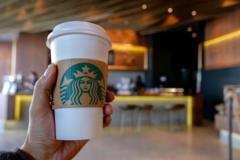As South Korea approaches a momentous presidential election, Starbucks has taken the unprecedented step of restricting the use of specific political candidates' names in its app, aiming to maintain neutrality during this highly charged period.
Starbucks Politically Navigates Presidential Tensions in South Korea

Starbucks Politically Navigates Presidential Tensions in South Korea
Starbucks bans political candidate names to ensure neutrality amidst South Korea's divisive election landscape.
Starbucks has opted to disable the use of several political candidate names on its app, reflecting a sensitivity to the charged political landscape in South Korea. The decision comes as the country prepares for the presidential elections on June 3rd, amidst heightened tensions following former president Yoon Suk Yeol's impeachment. The coffee giant's aim is to avoid any potential backlash from customers who might misuse drink orders to express political sentiments, as evidenced by past instances of patrons using phrases tied to their candidates as nicknames.
In a statement, Starbucks emphasized the importance of providing a pleasant experience for all customers and noted that excluding particular phrases could help avert misunderstandings in delivering orders. The barred names include prominent political figures such as Lee Jae-myung, Kim Moon-soo, and several others vying for the presidency. Some customers express discontent with this measure, arguing it may excessively limit individuality, given that certain names may be common.
Starbucks is not alone in its cautious approach; South Korea's major search engine Naver and various celebrities are also exercising political neutrality amidst the upcoming elections. Naver has implemented restrictions on its autocomplete features related to political figures to avoid biased information dissemination. Similarly, celebrities and public figures pay close attention to their public appearances, often opting for neutral colors and avoiding symbols that might be interpreted as endorsements of a political party.
Analysts note that the current climate demands heightened awareness regarding politics, as divisions have intensified. Dr. Cho Jin-man from Duksung Women's University highlights the importance of maintaining conversations about differing viewpoints without deepening divides. Yet, many choose to stay silent to protect their neutrality.
This cautious atmosphere surrounding political expression underscores an evolving narrative in South Korea as it navigates through its complicated political terrain.
In a statement, Starbucks emphasized the importance of providing a pleasant experience for all customers and noted that excluding particular phrases could help avert misunderstandings in delivering orders. The barred names include prominent political figures such as Lee Jae-myung, Kim Moon-soo, and several others vying for the presidency. Some customers express discontent with this measure, arguing it may excessively limit individuality, given that certain names may be common.
Starbucks is not alone in its cautious approach; South Korea's major search engine Naver and various celebrities are also exercising political neutrality amidst the upcoming elections. Naver has implemented restrictions on its autocomplete features related to political figures to avoid biased information dissemination. Similarly, celebrities and public figures pay close attention to their public appearances, often opting for neutral colors and avoiding symbols that might be interpreted as endorsements of a political party.
Analysts note that the current climate demands heightened awareness regarding politics, as divisions have intensified. Dr. Cho Jin-man from Duksung Women's University highlights the importance of maintaining conversations about differing viewpoints without deepening divides. Yet, many choose to stay silent to protect their neutrality.
This cautious atmosphere surrounding political expression underscores an evolving narrative in South Korea as it navigates through its complicated political terrain.


















